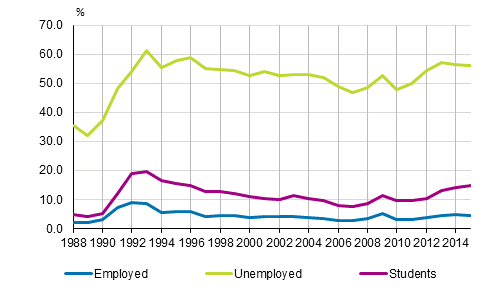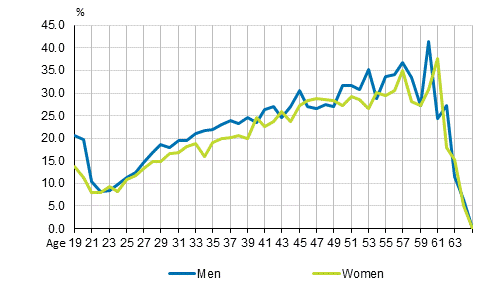Published: 25 May 2016
Unemployment risk among students trebled in 2015 compared to 1988
According to Statistics Finland's employment statistics, 14.8 per cent of the working-age students at the end of 2014 were unemployed at the end of 2015. The unemployment risk describes the share of persons that were unemployed one year later. In 1988, the unemployment risk of students was under five per cent. At the end of 2015, over 370,000 persons were unemployed. The data on unemployment in the employment statistics are based on the data of the Register of Job Seekers of the Ministry of Employment and the Economy.
Unemployment risk of employed and unemployed persons and students in 1988 to 2015

General unemployment risk has grown
The general risk of being unemployed at the end of 2015 among the working-age population (aged 18 to 64) in 2014 was 11.2 per cent. One year earlier, the corresponding risk was 10.7 per cent. The share has grown starting from 2011, when it was 7.5 per cent.
Examined by main type of activity, the unemployment risk was biggest among unemployed persons, of whom 56.1 per cent were unemployed at the end of both 2014 and 2015. The risk decreased slightly from the situation one year ago, when it was 56.6 per cent. The unemployment risk of employed persons declined from 4.7 to 4.5 per cent. The risk also fell among persons in military and non-military service.
Students’ unemployment risk has trebled
Between 2014 and 2015, the unemployment risk grew from 16.2 to 16.9 per cent in the group others outside the labour force, and from 14.2 to 14.8 per cent among students. In the long term, the unemployment risk of working-age students has trebled, as the risk was 4.8 per cent in 1988. The unemployment risk has only been higher than now during the recession in the 1990s (highest in 1993: 19.5%). The unemployment risk has also grown clearly in other groups compared to the end of the 1980s: among the unemployed to one-and-a-half fold and among employed it has doubled.
In 2015, the unemployment risk of students was higher for men (16.1%) than for women (13.6%). A large share of students are aged 20 to 30, for whom the unemployment risk was lower than for others.
Unemployment risk of students by gender and age in 2015

Unemployment risk highest for upper secondary level students
The risk to become unemployed was highest among upper secondary level students (21.9%) in 2015. The risk was lowest among lowest tertiary level or lower-degree tertiary level students (4.7%). The risk among doctorate students (9.6%) was higher than among higher-degree tertiary level students (7.9%). The number of tertiary level students that became unemployed was approximately 5,500 persons while among upper secondary level students the number was 24,800. During the past five years, the unemployment risk of all students has grown, in relative terms most among doctorate students.
Examined by field of study, the highest risk of becoming unemployed was found among students of services (20.8%), the risk was the second highest among agriculture and forestry students (18.1%), and technology students (18.0%). The risk was lowest among teacher education and educational science students (3.6%).
Eastern Finland has the highest unemployment risk
The unemployment risk among students also varied based on where the students were living. In 2015, the unemployment risk was lowest in Åland (7.9%), Ostrobothnia (11.3%) and Uusimaa (11.6%). The shares of students having become unemployed were highest in Kymenlaakso (20.2%), Kainuu (20.0%) and Päijät-Häme (18.3%).
Source: Employment Statistics, Statistics Finland
Inquiries: Aura Pasila 029 551 3576, info@stat.fi
Director in charge: Jari Tarkoma
Publication in pdf-format (219.1 kB)
- Tables
-
Tables in databases
Pick the data you need into tables, view the data as graphs, or download the data for your use.
Appendix tables
Updated 25.5.2016
Official Statistics of Finland (OSF):
Employment [e-publication].
ISSN=2323-6825. Main type of activity and status in occupation 2015. Helsinki: Statistics Finland [referred: 26.2.2026].
Access method: http://stat.fi/til/tyokay/2015/02/tyokay_2015_02_2016-05-25_tie_001_en.html

